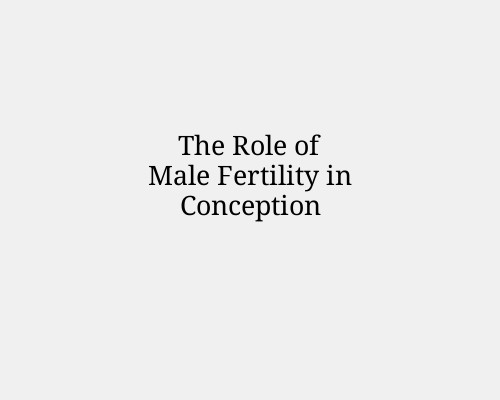
Male fertility plays a crucial role in conception, contributing to nearly half of the factors that determine a couple’s ability to conceive. While much of the focus in reproductive health is often on women, male fertility is equally essential and involves various factors such as sperm quality, quantity, and overall reproductive health.
Understanding Male Fertility
Male fertility primarily depends on the production of healthy sperm and their ability to reach and fertilize an egg. This involves multiple components, including:
Sperm Count: A healthy sperm count ranges between 15 million to over 200 million sperm per millilitre of semen. A low sperm count (oligospermia) can significantly reduce the chances of conception.
Sperm Motility: Sperm must be able to swim effectively to reach the egg. Poor motility (asthenozoospermia) can hinder fertilization.
Sperm Morphology: The shape and structure of sperm affect their ability to penetrate an egg. Abnormal sperm morphology (teratozoospermia) can decrease fertility.
Semen Volume and Quality: Adequate semen volume is necessary for carrying sperm through the reproductive tract. Issues like low semen volume or infections can impact fertility.
Factors Affecting Male Fertility
Several factors can influence a man’s ability to produce healthy sperm, including:
Lifestyle and Environmental Factors
Diet and Nutrition: A diet rich in antioxidants, vitamins C and E, zinc, and folic acid supports sperm health.
Exercise and Weight: Maintaining a healthy weight and regular exercise can enhance sperm quality, while obesity negatively affects fertility.
Smoking and Alcohol: Smoking reduces sperm count and motility, while excessive alcohol intake affects testosterone levels and sperm production.
Drug Use: Recreational drugs such as marijuana, cocaine, and anabolic steroids harm sperm production.
Heat Exposure: Prolonged exposure to high temperatures (hot tubs, saunas, tight clothing) can lower sperm production.
Environmental Toxins: Pesticides, heavy metals, and chemicals in plastics can negatively impact sperm health.
Medical Conditions and Hormonal Imbalances
Varicocele: Enlarged veins in the scrotum can overheat the testicles, reducing sperm production.
Infections: STIs, prostatitis, and other infections can impair sperm production and motility.
Hormonal Disorders: Low testosterone and imbalances in FSH, LH, and prolactin can affect sperm production.
Chronic Illnesses: Diabetes, kidney disease, and autoimmune disorders can impact fertility.
Genetic Conditions: Disorders such as Klinefelter syndrome or Y chromosome microdeletions can lead to infertility.
Improving Male Fertility
Men can take proactive steps to enhance their fertility, including:
Maintaining a Balanced Diet: Consuming foods rich in vitamins, minerals, and healthy fats supports sperm health.
Exercising Regularly: Moderate exercise improves testosterone levels and sperm function.
Avoiding Harmful Substances: Eliminating tobacco, reducing alcohol intake, and avoiding recreational drugs improve fertility.
Managing Stress: Chronic stress affects hormone levels and can reduce sperm production.
Seeking Medical Advice: If experiencing fertility issues, consulting a specialist can help identify underlying conditions and possible treatments.
Male Fertility and Assisted Reproductive Techniques (ART)
For men facing fertility challenges, medical interventions can help:
Sperm Retrieval Techniques: If sperm production is low, methods like testicular sperm extraction (TESE) can be used.
Intrauterine Insemination (IUI): Processed sperm is placed directly into the woman’s uterus to enhance fertilization chances.
In Vitro Fertilization (IVF): Sperm is combined with an egg in a lab, and the resulting embryo is implanted in the uterus.
Intracytoplasmic Sperm Injection (ICSI): A single sperm is injected directly into an egg to facilitate fertilization.
Conclusion
Male fertility is a critical component of conception, and its optimization can significantly improve the chances of pregnancy. Understanding the factors that influence sperm health and making lifestyle or medical interventions can enhance fertility. For couples struggling to conceive, professional medical evaluation and treatment options are available to address underlying issues.
